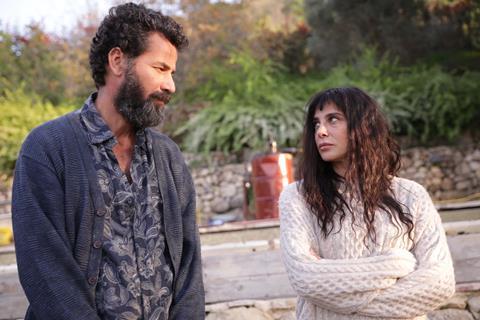A terrific debut from Mounia Akl set in a Lebanese mountain idyll – until the landfill arrives next door

Dir. Mounia Akl. Lebanon/France/Spain/Sweden/Denmark/Norway/Qatar. 2021. 106 mins
High in the hills, removed from the pollution and the corruption which taints the rest of the country, a Lebanese family has made a kind of an idyll. It’s a simple life – spent tending vegetables, pressing olive oil, wrangling chickens and home schooling the children. And crucially, it is far away from Beirut, a place which, with its political climate and its stewing heaps of garbage, is no longer a liveable option for Walid (Saleh Bakri), although his wife Soraya (Nadine Labaki) a former singer, still yearns for the city life. Then the family learns that the land adjoining has been earmarked for a landfill site. And they know enough about the government to realise that the promises of environmental sensitivity are hollow. Costa Brava, Lebanon is a terrific feature debut from Mounia Akl which works both as a compelling domestic drama and an elegant political allegory.
Works both as a compelling domestic drama and an elegant political allegory
It’s a picture which has much to recommend it, not least the star power and chemistry of Labaki and Bakri. Costa Brava, Lebanon is also tonally intriguing, sharing a similar sense of besieged insularity to that of Ursula Meier’s Home, a film with which it also finds a kinship in its layers of symbolism. It’s worth noting that Akl co-wrote the screenplay with Clara Roquet, who is also credited on Jaime Rosales’ Petra and whose directorial debut Libertad screened in Cannes Critics Week earlier this year. Distinctive enough to make its mark with arthouse audiences, this is a film which could break out of the festival circuit with the support of an engaged distributor or streaming platform.
While the family may exist in a self-constructed vacuum, the filmmaking does not. Akl opens the film with a cheeky nod to the opening shot of Fellini’s La Dolce Vita. But rather than a Christ statue gliding above the outskirts of Rome, we follow a concrete effigy of the president which is hauled, ignominiously, on a flatbed truck through the piled trash of the insalubrious fringes of Beirut. He is destined, it turns out, to be mounted on the hillside just below the Bacri family residence, a harbinger of an influx of further unwelcome visitors – labourers and a young, handsome site manager.
They’re greeted with thinly veiled animosity by Walid and his youngest daughter Rim (sparkily played by identical twins Ceana and Geana Restom). Rim catapults rocks at the men, while her father shoots glowering eye daggers over the partitioning fence. But the rest of the family are more amenable. Walid’s ailing mother Zeina charms the workmen into buying packs of forbidden cigarettes; Soraya, recognised by fans who grew up listening to her music, can’t help playing to the audience once again. And 17-year-old Tala (Nadia Charbel), the Bacri’s older daughter, whose adolescence has played out in isolation, experiences the first awkward stirrings of sexual awakening.
Poisons soon spread from the landfill into the earth and the air – the rubbish is burnt, illegally, as soon as the eyes of the media have turned away from the site (the promise of a ‘green’ landfill is, like all the other campaign promises in the forthcoming election, made to be broken). The noise from the dump – the blaring disposable pop music, the grinding heavy machinery – is another kind of pollution, a point which is emphasised by the film’s sound design. And so the toxicity leaks into the family relations. A lovely scene shows the mother recounting to her daughters (Rim squirming, Tala rapt) the story of how she met their father. It was after a violent protest in the city; she inadvertently spilt whisky onto his injuries, then laughed because he made such a fuss about it. But the subtext is clear – for a marriage with its roots in dissent, it’s hard not to see this retreat to the hills as a kind of defeat. The arrival of the landfill drives a wedge into a crack that had already formed between Walid and Soraya, who are split over the question of where best to fight for the life they want for their kids – on the embattled homestead or back on the frontline in Beirut.
Production companies: Abbout Productions, Snowglobe, Participant Medoa, Cinema Defacto, Lastor Media, Fox in the Snow Films AB, Barentsfilm As, Gaïjin, Boo Pictures
International sales: mk2 Films intlsales@mk2.com
Producers: Myriam Sassine, Georges Schoucair
Screenplay: Mounia Akl, Clara Roquet
Cinematography: Joe Saade
Editor: Cyril Aris, Carlos Marques Marcet
Production design: Thomas Bremer, Issa Kandil
Music: Nathan Larson
Main cast: Nadine Labaki, Saleh Bakri, Nadia Charbel, Ceana and Geana Restom, Yumna Marwan, Liliane Chacar
























